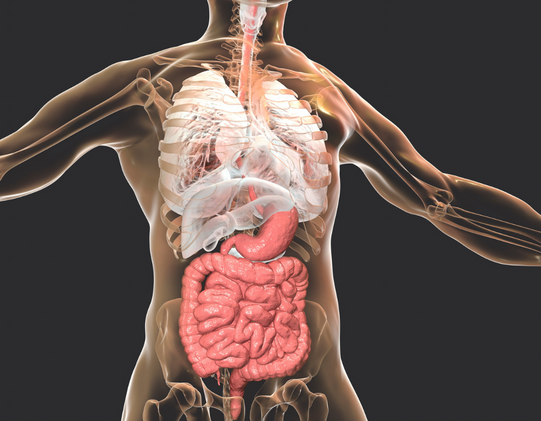
Extended Fasting 101
February 24, 2024
Digestive Enzymes: An Overview
February 27, 2024
It’s no secret that our gut health plays a crucial role in our overall well-being.
Everything from digestion and immunity to mood and mental health is impacted by our gut.
In fact, our gut is often referred to as our second brain so when we’re destroying our gut we’re also destroying our brain. If either isn’t functioning properly due to poor dietary or lifestyle choices, you could experience serious consequences and some unfavorable symptoms.
Unfortunately, there are a number of common things we come into contact daily that is detrimental to our gut health. These things are most likely in your home right now. They are known to cause symptoms such as bloating, pain, constipation, inflammation and many more. They may even be the culprit for autoimmune diseases.
The Worst Offenders Against Gut Health
Sugar: When we consume sugar in large amounts, it can feed the bad bacteria and cause them to grow out of control, leading to imbalances in the gut microbiome. This can lead to inflammation and other gut-related issues such as irritable bowel syndrome (IBS) and inflammatory bowel disease (IBD). To avoid this, try to limit your intake of added sugars and opt for natural sweeteners like honey instead. Check out this free guide that goes into great detail about the effects of sugar and how companies sneak it into their products.(1)
GMOs: Genetically modified organisms (GMOs) may be a controversial topic, but one thing is for sure: they negatively impact our gut health. Studies show that consuming foods with GMOs can lead to an imbalance in gut bacteria, which leads to inflammation and other issues. Some tips to avoid them: buy organic, look for non-gmo labels and avoid “at-risk” ingredients such as corn, soy and canola. (2)(8)
Medications: Medications such as antibiotics disrupt the balance of microorganisms in the gut. This leads to conditions such as antibiotic-associated diarrhea or Clostridium difficile infections. Non-steroidal anti-inflammatory drugs (NSAIDs) can also irritate the stomach lining and cause ulcers. Opioid painkillers can slow the movement of food through the digestive tract, which can lead to constipation. To help eliminate some of the effects of medications, it’s important to prepare the body for medication usage, practice good gut health while taking them and heal the gut afterwards. Learn more here: The Dangers of Antibiotic Overuse.(3)
Vegetable Oil: Vegetable oils are highly processed and refined. For example, soybean, corn and canola oil have negative effects on gut health due to several reasons. Firstly, many vegetable oils are high in omega-6 fatty acids, which have been linked to inflammation in the body. When consumed in large amounts, they can lead to an imbalance in the ratio of omega-6 to omega-3 fatty acids, which can contribute to inflammation and gut disorders such as Crohn’s disease and ulcerative colitis. Additionally, many vegetable oils may contain harmful chemicals such as solvents, bleaches and deodorizers. These chemicals can cause gut irritation, inflammation and can disrupt the balance of the gut microbiome. The Importance of Omega-6 and Omega-3 Fatty Acids explains more on this.(4)
Stress: Stress can have a big impact on our gut health, as it can disrupt the balance of good and bad bacteria in our gut. Chronic stress and depression can lead to inflammation, leading to the gut bacteria releasing metabolites, toxins and neurohormones that can alter eating behavior and mood. To avoid this, try to limit your stress levels by practicing relaxation techniques like yoga, meditation, or deep breathing. Oftentimes, stress goes alongside depression and anxiety. If that’s the case, please check out the top supplements for anxiety and depression.(5)
Sugar Alcohol: Sugar alcohols are a popular sugar substitute, but they can be difficult for some people to digest. Sugar alcohols include isomalt, maltitol, lactitol, and xylitol. These are all known to create an imbalance in the gut microbiome leading to bloating, gas, stomach pain and diarrhea. If you experience these symptoms after consuming sugar alcohols, it’s best to avoid them.(6)
Cleaners: Many household cleaners contain harsh chemicals that can disrupt the balance of good and bad bacteria in our gut. These chemicals can include things like chlorine, fluoride and other toxins that can disrupt the balance of gut bacteria. This leads to inflammation, which contributes to issues such as irritable bowel syndrome (IBS), inflammatory bowel disease (IBD), etc. Use more natural cleaning products or create your own with ingredients like white vinegar and baking soda. Increase the ventilation in the area that you are using these products.(7)
Chlorine/Fluoride: Chlorine and fluoride are added to the water supply for purification. Chlorine is a strong oxidant that can kill harmful bacteria, viruses and other pathogens in water. However, it also disrupts the balance of good and bad bacteria in the gut, leading to inflammation and other gut-related issues. Fluoride, on the other hand, has a negative impact by reducing the amount of beneficial bacteria in the gut. To minimize risk, opt for a water filtration system that removes chlorine and fluoride from your water.
Dairy: Dairy can be difficult for some people to digest, which can lead to gut-related issues. The main reason for this is the presence of lactose, a sugar found in milk and other dairy products. The enzyme, lactase, is needed to break down lactose and some people don’t have enough. When lactose is not properly digested, it causes bloating, gas and diarrhea because it feeds bad bacteria.
Gluten: Gluten is a protein found in grains like wheat, barley and rye. It can be difficult for some people to digest because gluten is a large protein that can be difficult to break down, and it can cause damage to the gut lining. Additionally, studies show that consuming gluten increases the risk of inflammatory bowel disease (IBD) and other gut-related issues. Learn about all things gluten here.
Conclusion
It’s important to be aware of the things that can destroy gut health to mitigate the damage. The above items cause gut inflammation and disrupt the delicate balance of bacteria, leading to a host of health issues. However, by being mindful of the products we use and food we consume, we can improve gut health. It is important to make conscious choices about the items we use daily. As with anything, awareness is the first step to resolving a problem, so please share this article with your loved ones! For more on gut health (including supplements) check out Gut Health FAQ.
Found this article interesting?
For more tips and the latest and greatest in health optimization, follow me on Instagram.
Sources
- Mkaye. “GMOs and Gut Health.” The Center for Functional Health, 21 Oct. 2021, https://thecenterforfunctionalhealth.com/blog/gmos-gut-health/
- “Sugar Disrupts Microbiome, Leading to Metabolic Disease and Diabetes.” Medical News Today, MediLexicon International, https://www.medicalnewstoday.com/articles/sugar-disrupts-microbiome-and-immune-function-leading-to-metabolic-disorders.
- Ramirez, Jaime, et al. “Antibiotics as Major Disruptors of Gut Microbiota.” Frontiers in Cellular and Infection Microbiology, U.S. National Library of Medicine, 24 Nov. 2020, https://www.ncbi.nlm.nih.gov/pmc/articles/PMC7732679/.
- Lam, Justin. “Healthy or Not? What You Need to Know about Vegetable Oil.” Dr. Lam Coaching – World Renowned Authority on Adrenal Fatigue Recovery, 4 Oct. 2020, https://www.drlamcoaching.com/blog/healthy-or-not-what-you-need-to-know-about-vegetable-oil/#:~:text=Inflammatory%20foods%20like%20refined%20vegetable,leaks%20in%20the%20gut%20lining.
- Madison, Annelise, and Janice K Kiecolt-Glaser. “Stress, Depression, Diet, and the Gut Microbiota: Human-Bacteria Interactions at the Core of Psychoneuroimmunology and Nutrition.” Current Opinion in Behavioral Sciences, U.S. National Library of Medicine, Aug. 2019, https://www.ncbi.nlm.nih.gov/pmc/articles/PMC7213601/#:~:text=Additionally%2C%20stress%20and%20depression%20can,species%20may%20encourage%20dysregulated%20eating.
- Top Reasons Sugar Alcohols May Not Be a Good Sugar Substitute – Umms Health. https://health.umms.org/2022/02/24/sugar-alcohols/.
- Wheddon, Kathy. “Cleaning Products Hurt Gut Health.” Probiotics Learning Lab, Optibac Probiotics, 10 May 2021, https://www.optibacprobiotics.com/learning-lab/in-depth/childrens-health/are-cleaning-products-impacting-kids-gut-health.
- “Shoppers Guide to Avoiding GE Food: | Tips for Avoiding Gmos.” Center for Food Safety, https://www.centerforfoodsafety.org/issues/311/ge-foods/shoppers-guide-to-avoiding-ge-food/1




